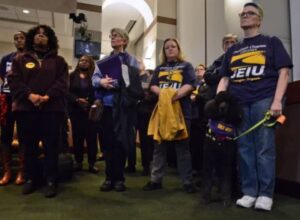
by James A. Bacon
Virginia’s slow-but-steady metamorphosis into New Jersey continues apace. The Loudoun County board of Supervisors has voted to let unions into county buildings to recruit public employees. Reports Loudoun Now:
Currently, under state law, state and local governments are not allowed to recognize any union or collective bargaining. … But with a new state law signed in April and going into effect in May 2021, localities may elect to recognize collective bargaining representatives, allowing unions to negotiate on behalf of employees.
Democrats on the county board are moving toward that possibility, starting with a party-line vote on Oct. 20 to allow labor associations and organizations with more than 100 members to hold open houses twice per year in the Shenandoah Building and County Government Center in Leesburg, and in the county government offices on Ridgetop Circle in Sterling. Supervisors also directed the staff to allow for those organizations to include materials in the county’s new hire packets, if they have more than 100 members who are Loudoun County government employees.
The Democrats on the Loudoun board aren’t just willing to tolerate public-employee unions. They’re embracing public-employee unions. They are welcoming state employees into the Democratic Party machine. If you understand how the political economy of public-employee unions works in New Jersey and every other state in the U.S. that engages in collective bargaining with public employees, the reasons are abundantly clear.
Step one: A political symbiosis emerges. In bargaining sessions, Democratic office holders reward public employees with higher wages and retirement benefits. Public employees reward Democratic office holders with votes and campaign contributions.
Step two: It quickly becomes apparent that higher wages must be paid for now, which increases pressure to raise taxes. Accordingly, Democrat office holders find politically easier to increase retirement benefits, which can be paid for later (if ever).
Step three: State and local governments fail to put aside enough money to pay for future retirement benefits, and unfunded liabilities increase. The underfunding is most severe in two types of states: poor states and states that bargain with public-employee unions that run up costs. As Virginia embraces public bargaining by government unions, it will move into the second category.
At present, Virginia has managed avoid letting its unfunded liabilities run out of control. According to Yahoo! Finance, “Virginia’s per-person unfunded pension liabilities increased by only 5.9% last year, placing it among the 15 lowest in the country.” The Virginia Retirement System has its issues, to be sure, but Yahoo! Finance rates it the 10th best funded in the country.
But that’s today. As our political economy increasingly resembles that of the Garden State, so will our government pension system. And New Jersey, says Yahoo! Finance, has the 10th worst pension funding in the country.
The Blue state model of governance does a wonderful job of keeping the Democratic Party coalition in power, but it runs on borrowed money and borrowed time. That’s where Virginia is heading.

Leave a Reply
You must be logged in to post a comment.